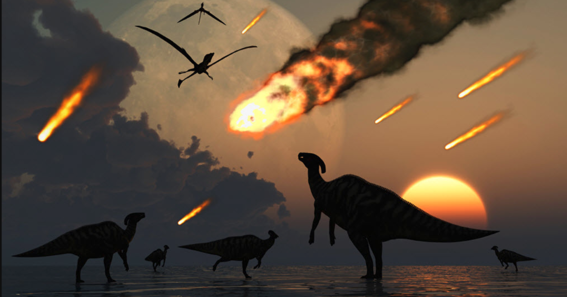
We are all gonna die. It is an irrefutable truth and it only takes a few years for it to become effective. The end of life - physical - awaits patient until the inexorable hour arrives. The bodies end up decomposing, each cell is reunited with its environment and the individual remains only the memory. I remember that, by the way, it will be extinguished forever with the death of those who carry it in memory.
The "end of the world", on the other hand, is another matter. Millions of heated debates come together in this topic. When will it be? How? Where? Nobody knows. The greatest scientific advance: the hypothetical approaches in this regard.
One of those theories enunciates the sixth mass extinction. In it, it is assumed that forces of nature will intervene which, in total chaos and disaster, will resolve to end life as we know it. The sustenance of this fateful hypothesis rests on the existence of 5 previous extinctions that hit life on Earth throughout its history:
The great extinction of the Ordovician
The first, the great extinction of the Ordovician that took place 499 million years ago. In that then, the changes in the sea - supposedly produced by some event of stratospheric dimensions in the space - caused that 85% of the species disappeared.
Devonian Extinction
The second, the extinction in the late Devonian happened about 360 million years ago. On that occasion it was also the marine animals that suffered the terrible consequences but, this time, by a current of lava that emerged from the center of the earth. 82% of the species perished.
The extinction of the Permian
It is said that this event took place 300 million years ago. According to experts, this was the most devastating extinction that has existed in the history of the planet, with the death of 96% of terrestrial species. Although it is not known with precision what it was that triggered the disaster, it is said that it could have been an internal terrestrial change.
Extinction of the Triassic
This extinction took place about 210 million years ago. The cause was a great earthquake as a result of the rupture of the Pangea. This led to a very intense volcanic activity, which ended with a large part of terrestrial and maritime life.
Extinction of the Cretaceous
This was the extinction of the dinosaurs and it is supposed to have happened about 66 million years ago. With her, not only did these enormous beings die, but also 76% of the animals and plants. It is said that the temperatures of the planet were extremely high and the level of the sea flooded almost half of the continents.
These 5 major catastrophes have been documented by science, and yet there are many disparate theories that try to explain them. That is why understanding the true reasons and the effects becomes extremely complicated. However, what is certain is that life on the planet has suffered such huge setbacks and species have perished due to it.
Will there be a sixth extinction?
In this regard, National Geographic interviewed the journalist Elizabeth Kolbert, author of the book The Sixth Extinction, which won the Pulitzer Non-Fiction 2015. When asked if we really are close to this sextra tragedy, explained:
"By the time we get a definitive answer to that question, it's possible that three-quarters of the planet's species have disappeared. We are not interested in getting to the point where we can give a definitive answer to that question.
What is clear, and beyond all discussion, is that we live in a time when the rate of extinction is very high, of the order we could observe during a mass extinction, although a mass extinction can take many thousands of years to develop »
The researcher emphasized that this time, it is humanity that has accelerated the possibilities of the extinction of life:
"I do not think there is any doubt that we are responsible for the current high rate of extinction. Very few of the extinctions of the last hundred years, if any, would have been reproduced without human activity. I have never heard anyone say "oh, the extinction rate is just something natural that would have happened with or without man". It is almost impossible to think that ».
However, his version is not alarmist. Note that while it may be probable, there is no date or cause that is in sight. According to her, when these events take place, biodiversity takes millions of years to recover, but it always does.
Life never ceases. In spite of these catastrophes, he always finds a way to manifest himself as a place. Thanks to that, human beings exist on Earth. Despite these 5 huge hecatombs, the Earth continues to create new and varied species. Probably, if some distant day came to pass the sixth extinction, it would not be the exception.
Very nice article you have there! But do not forget to cite your sources and credit your images when necessary